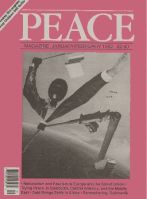
Peace Magazine Jan-Feb 1992, page 28. Some rights reserved.
Search for other articles by Erik Poole here
Howard Peter Langille (author); Changing The Guard: Canada's Defence in a World in Transition
Writing about defence policy and national security nowadays is a risky business. Magazine and journal articles published as late as even 1989 and 1990 have a decidedly dated feel to them; many experts must be quietly relegating these tracts to the farthest corners of their curriculum vitaes.
Much has happened since Peter Langille put to bed the manuscript for this "blue paper" on Canadian defence policy sometime in June 1990: Oka, the Persian Gulf, the aborted coup d'etat in the Soviet Union and so on. But its central message is as relevant now as ever before. The world has changed, the Cold War is over and Canadian defence policy must change to reflect the new realities.
I say the book is a "blue paper" because blue is an optimistic color of hope and idealism. Changing the Guard begins by analyzing how the external threat environment, Canada's bilateral and multilateral alliances, and domestic pressures for defence jobs and profits have shaped Canadian defence policy in recent years. It then goes on to explain how a philosophy of Common Security, coupled with armed neutrality, could enable Canada to contribute to a just and lasting global peace.
I liked the book because it has an honest, genuine tone. Langille appears to have talked to everybody from peace activists to senior military officers. The book is well researched, balanced, thoroughly documented, and extensively footnoted. There is sufficient information about competing points of view to give the uninitiated reader a sense of the fuller debate behind the issues. Peter is not for unilateral disarmament. He recognizes the need for a standing army and commends the Canadian Armed Forces for their professionalism.
"Long-war" scenarios that were used to justify defence build-ups in the early 1980s, were driven in part, he suggests, by business motives. So was Canada's defence industrial base preparedness planning.
However, although he did not say so explicitly, Langille seems to believe that the relationship between Canada and the United States is neo-colonial. The big-brother image lies behind his analysis of Canada's defence and arms production, as well as its trading relationship with the United States. For years, intellectuals in Third World countries were so convinced that they were dependent on the United States that they did not even use the power that they actually had. Even many Canadians convinced themselves that they were dependent on the United States, which made them less effective as agents of social change.
Langille exaggerates the growth in defence exports by reporting them in current dollars. This lacks rigor. None of the numerous references to "high profits" in the defence industry were footnoted. Of course not. The limited evidence for Canada suggests that the profits of defence firms are on average no different from other companies. Some evidence from the USA suggests that defence profits are on average lower than similar profits for firms selling to commercial customers. The innuendo is that "big business" disproportionately influences defence policy. I finished that section unconvinced.
Langille also implies that there was a connection between the Canada-USA free trade talks and delaying Canada's withdrawal from Germany. That, too, was unconvincing. Finally, I was not convinced by his suggestion that Canada could adopt armed neutral stance-and finance it by withdrawing forces from Europe. Armed neutrality as an option would cost plenty; Canada would come under considerable pressure to assure the United States that our territory could never be used to attack them.
This said, the book was for me at times inspirational, especially where Langille argues in a nuanced way that Canada should move from deterrence to dissuasion-which implies a "non-offensive defence." He wrote, "It is important to recognize three salient points: first, the military threat has changed; second, Canada's armed forces need not be committed to deterrence; and third, those who pursue the strategy don't need Canada to support their efforts."
Readers of this magazine will enjoy this book. It lacks a glossary of acronyms, but otherwise much effort has been made to make a complicated subject accessible and immediate.
Erik Poole is a defence economist.

Peace Magazine Jan-Feb 1992, page 28. Some rights reserved.
Search for other articles by Erik Poole here